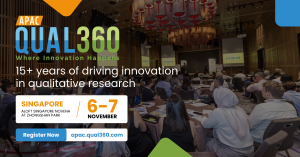Discover the challenges of user research in South Asia through Valerie Tham’s insightful video presentation from Daraz (Alibaba Group).
In our presentation highlight, Valerie Tham, UX researcher at Daraz, delves into the complexities of conducting user research in South Asia, particularly among populations with limited digital proficiency and language barriers. She shares her experience of adapting communication methods, such as using SMS instead of WhatsApp, to better connect with local users. Valerie highlights the importance of addressing challenges like low internet adoption and e-commerce penetration in the region and outlines strategies for recruiting users, including the “Y AIS” framework (yield and accessibility of users). She also emphasizes the need for experimenting with various digital communication channels and tools to effectively engage the target audience.
You can find all QUAL APAC conference recordings for free in our video section!
Video transcript below (This is an AI-generated summary. There may be inaccuracies.)
In the first part of the session, Valerie reflects on the hurdles of conducting quality user research in countries like Pakistan, Bangladesh, and Sri Lanka, where Daraz serves 30 million shoppers and half a million sellers with a small research team. Valerie, who began her career in customer experience with a focus on the voice of the customer and NPS studies, encountered communication barriers with locals like her driver, Basia, who didn’t use WhatsApp. This prompted her to switch to SMS for better communication. Valerie underscores the significance of starting from scratch and highlights the beauty of the places and people she encounters during her work trips.
The speaker recounts a specific challenge while conducting research in Bangladesh with a participant named Bas, who used a 2G phone and had limited English proficiency. Connectivity issues and cultural sensitivities further complicate the process. She discusses the broader challenges of low internet adoption and e-commerce penetration in South Asia and stresses the importance of understanding these unique barriers to effectively reach users with limited technology access.
The session also covers strategies for recruiting participants in these hard-to-reach populations. Valerie recommends starting with the most accessible users, who can provide substantial information, before moving on to harder-to-reach groups. She emphasizes the need to understand the audience’s preferred communication methods, sharing an example where email was ineffective, leading to an experiment comparing SMS and WhatsApp. The presenter highlights the importance of considering cost differences when selecting digital channels.
Valerie further discusses engaging users in Asia’s tier two and tier three cities through various digital communication channels. She shares an experiment where translating content into local languages significantly increased response rates. She highlights the value of customer support teams and WhatsApp communities in gaining insights into user experiences and stresses the need for continuous experimentation and adaptation to different markets and channels.
The speaker also explores the use of digital tools to access hard-to-reach populations, such as recording user experiences via webcam and microphone during design testing. This method allows users to express their thoughts and feelings in their own words, even without face-to-face interaction. She emphasizes the importance of using simple technology and clear instructions, particularly in South Asian markets. Valerie mentions their ongoing experimentation with various tools, including asynchronous and unmoderated testing, to gather the necessary insights, noting Ballpark as one of the tools they’ve used for recording user voices.
Finally, Valerie discusses the broader challenges of implementing digital tools in these markets, including issues like platform loading failures and delays caused by unpassed screening requests. Despite these obstacles, she expresses her passion for working in dynamic markets and building local research teams. She also addresses user hesitancy towards audio and video recording, noting that while some users are reluctant, others are more open, especially in certain cultural contexts. She concludes by emphasizing the importance of demonstrating impact and strengthening research teams to conduct more robust and high-quality studies.
Our QUAL360 APAC 2024 agenda features presentations from Coca-Cola, Meta, Spotify, HP, Globe Telecom, Singtel, Flipkart and many other industry leaders. Join Qual360 APAC on November 6&7 in Singapore to get your latest updates on qualitative methodologies, new research technologies, generative AI, scaling qual research and much more. Even better – if you register TODAY you can still grab the ticket with the discount! Waiting any longer will cost you up to $200 extra.











 by
by 


